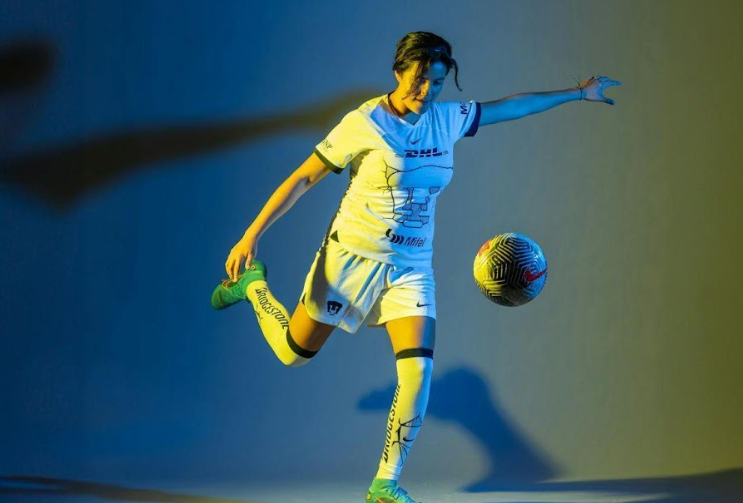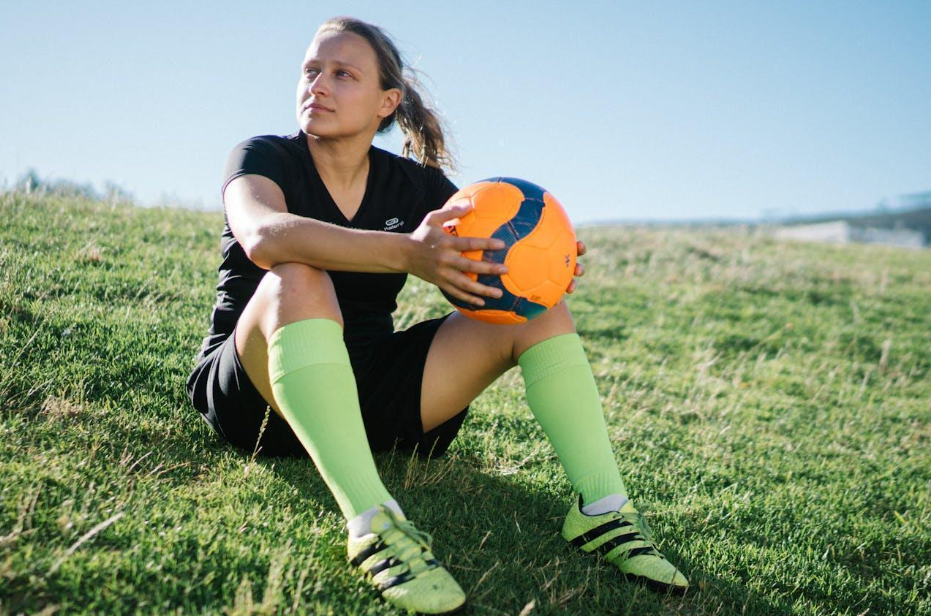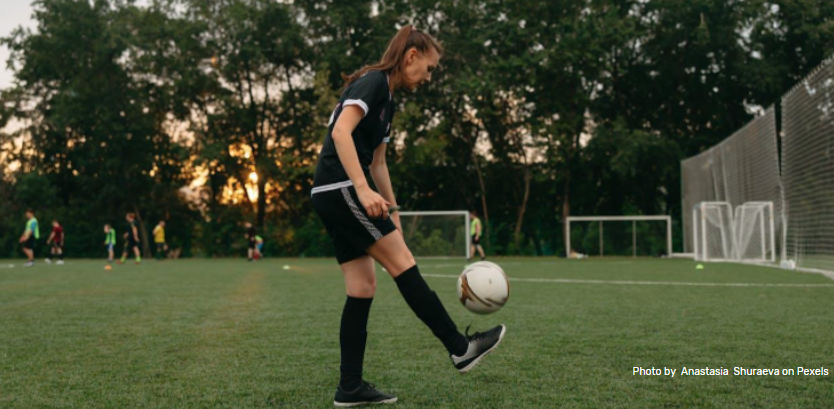This blog post represents the author’s views and should not be interpreted as professional/medical advice or endorsed by NEDA.
What happens when the drive to succeed as an athlete turns into something harmful? Soccer has been a part of my life for as long as I can remember. I started playing when I was 5, and the sport quickly became my world. By the time I got to college, soccer wasn’t just a passion but part of my identity.
However, beneath the success and dedication, I struggled in ways no one could see. Eating disorders in athletes aren’t uncommon, but my battle was something I hid for years, convinced I could manage it on my own.
The Pressure Athletes Face
Athletes are often seen as the epitome of strength, discipline and perseverance. Behind the accolades and victories, many of us grapple with immense pressure. There’s the constant demand to perform at your best, whether in practice, games or even during the off-season.
Add in the pressure to maintain a certain body type, meet coaching expectations, stay competitive and keep up with academics, and it can start to feel overwhelming. Unfortunately, we’re not always taught the necessary coping strategies to deal with the pressure of playing sports at a competitive level.
For me, the pressure to succeed was self-imposed as much as it was external. I felt like I always had to be perfect — on the field and off. I believed that controlling my body and pushing my limits would make me the best athlete I could be. Instead, it led me down a path of compulsive behaviors and an eating disorder that took years to recover from.
Here’s what athletic pressure looked like for me:
- Constantly striving to be the best with no room for mistakes.
- Obsessively scrutinizing my body and feeling like it was never good enough.
- Exercising for hours each day.
- Feeling overwhelming pressure to perform perfectly during games and practices, fearing failure and letting others down.
- Worrying that even a minor performance slip could jeopardize my spot on the team.
- Constantly comparing myself to teammates and opponents.
- Pushing through injuries and exhaustion to meet unrealistic expectations.
- Avoiding social situations outside of sports to stay focused on training and maintain control over my eating and exercise habits.
How Perfectionism and Body Dysmorphia Took Over
My eating disorder didn’t happen overnight. It started with small, subtle changes to my eating and exercise habits. At first, it felt like discipline. I cut back on certain foods, trained a little harder and convinced myself that these habits would make me a better soccer player. However, over time, my thoughts about food and exercise consumed my entire life.
Compulsive exercise became my new normal. Outside of soccer practices and games, I would spend four to five hours a day working out in secret. I’d wake up early or stay up late to fit in extra sessions.
I avoided rest days, believing they would make me weak and lead to weight gain. Every calorie I burned felt like a step closer to being “better,” even though I was pushing myself to the brink. Body dysmorphia only made things worse. No matter how much weight I lost or how fit I thought I became, I could only see flaws in the mirror. I was stuck in a constant cycle of not feeling good enough, and the harder I pushed myself, the more my physical and mental health suffered.

Photo by Kuiyibo Campos on Pexels
The Breaking Point
By the time I reached college, the toll on my body and mind was undeniable. I was severely underweight and exhausted, yet I couldn’t stop. My grades were slipping, my fitness was at an all-time low, my anxiety was through the roof, and I often felt distressed and overwhelmed. I rarely slept through the night, and even when I lay in bed, my mind was racing — counting calories, planning workouts or obsessing over what I ate that day.
Anxiety is a common condition, especially for those already experiencing an eating disorder. As many as 40 million Americans deal with anxiety, and roughly 8% of children and teens are also affected. I knew I wasn’t alone, but this didn’t stop my racing thoughts and constant overwhelm.
Eventually, everything came to a head. I realized that despite all my efforts to control my body and my performance, I wasn’t thriving — I was barely surviving. My love for soccer — the sport that had once brought me so much joy — was overshadowed by my struggles.
Asking for Help
Admitting I needed help was one of the hardest things I’ve ever done. As an athlete, I was used to pushing through pain and challenges on my own, convincing myself that I could handle anything. Asking for assistance felt like admitting weakness — a thought that terrified me.
The truth was, I couldn’t do it alone anymore. I was exhausted and overwhelmed, and my body was breaking down. My loved ones could see it, even when I tried to hide it.
One day, I finally opened up to a close friend who encouraged me to talk to someone more qualified. That conversation became the first of many steps toward recovery.
I reached out to a counselor who specialized in eating disorders in athletes, and that was the best decision I’ve ever made. My counselor helped me understand that what I was going through wasn’t just about food or exercise but rather about deeper issues like perfectionism, self-worth and control. She worked with me to untangle those thoughts and rebuild a healthier mindset.
She diagnosed me with anorexia nervosa — something I already knew deep down but had never fully acknowledged. I’d spent so many years hiding my behavior and pretending like everything was fine, but I couldn’t pretend any longer. The relief I felt in finally having a professional confirm my struggles was mixed with a sense of fear. At that moment, I felt so alone, like I was the only one going through this.
I soon learned that I wasn’t alone — far from it. The link between athletes and eating disorders is common. In fact, roughly 9% of the American population will experience a severe eating disorder at some point in their lives.
That statistic was sobering, but it also gave me some perspective. I wasn’t a rare case — there were others out there fighting similar battles. The power of knowing I wasn’t alone was one of the first steps in breaking free from the isolation that had kept me trapped for so long.
What surprised me most about asking for help was how much support I received. My family, teammates and friends rallied around me, reminding me I wasn’t alone in this journey. If anything, reaching out made me feel stronger, not weaker.

Photo by RF._.studio on Pexels
Recovering From an Eating Disorder as an Athlete
Recovering from anorexia nervosa wasn’t a quick or linear process, but it was transformative. With the support of my loved ones and professional guidance, I began to rebuild my relationship with food, exercise, sports and myself.
One of the most important changes I made was learning to treat exercise as a form of self-care rather than punishment. I traded grueling workouts for lighter, healthier routines that left me feeling energized rather than depleted. I also focused on eating a balanced diet to fuel my body with the nutrients it needed to heal and grow.
Beyond physical changes, recovery also meant reconnecting with the world outside of sports and food. I began spending more time with my friends, exploring hobbies and rediscovering who I was beyond being a college athlete.
I discovered a love of reading and spending time outdoors, slower hobbies that didn’t leave me burned out. Yoga became one of my go-to forms of movement, as it improved my body image and fostered a sense of positive self-awareness. These moments of connection reminded me that my worth wasn’t tied to my performance or appearance.
Life After Competitive Sports
Today, I no longer play sports at a college level, but I still hold soccer close to my heart. Ironically, playing at such a high level ultimately pushed me to ask for help — it became the last straw that saved my life. The intense pressure, long training hours and constant scrutiny of my performance — largely self-inflicted — began to feel overwhelming.
As much as I loved the game, it became less about passion and more about meeting impossible standards I’d set for myself. The stress of constantly trying to maintain my body in a certain way and perform at a level I thought was required was taking a mental and physical toll on me. It was at this point that I realized I couldn’t continue down this path without risking my health — something I’d taken for granted for so long.
This isn’t a story about discouraging others from pursuing college sports. College athletics is an incredible experience, full of growth and friendship. For me, soccer was my source of happiness for years, and I wouldn’t trade those memories for anything. The issue wasn’t the sport itself but the pressure I put on myself to be perfect, to constantly prove I was worthy of my place on the team.
At some point, the desire to be the best I could be turned into an obsession, and it wasn’t until I realized this that I asked for help. It wasn’t the sport that broke me — it was my unhealthy mindset surrounding it.
In hindsight, I can see now that playing at a collegiate level pushed me to confront my struggles in a way nothing else could. The combination of the pressure to perform, my intense perfectionism and the constant focus on my body began to weigh on me. However, it wasn’t the end of my athletic journey but the beginning of a new chapter where I learned how to approach health and fitness in a more balanced and sustainable way.
I’ve since found a healthier relationship with exercise, one that doesn’t involve pushing my body to extremes but focuses on moving in ways that feel good. I still enjoy staying active, but it’s no longer about maintaining a certain weight or appearance. It’s about feeling strong and energized.
Recovery has taught me there’s so much more to life than being a “perfect” athlete. You can still be strong, competitive and passionate about your sport without sacrificing your well-being.
The Importance of Awareness and Early Intervention
One of the most important lessons I’ve learned through my recovery is that awareness can save lives. Eating disorders in athletes often go unnoticed because the intense training, strict diets and disciplined mindset can mask harmful behaviors. This is why sharing information and resources is so critical — it encourages early detection and intervention before the disorder takes a severe toll.
There’s no better time than now to recognize the signs, have difficult conversations and seek help. If we normalize discussions about athletes and eating disorders, we can help others feel less alone and empower them to get the support they need before it’s too late.
A Message of Hope
To any athletes reading this, know that you’re not alone. If you feel overwhelmed by the pressure to perform or struggle with your relationship with food or exercise, please don’t hesitate to ask for help. Eating disorders in athletes are serious, but recovery is possible, and there’s so much hope on the other side.
Your worth isn’t tied to your performance, your body, your diet or your accomplishments. Life after recovery has taught me that you don’t need to sacrifice your health to be good enough.
Finding Balance
Recovering from an eating disorder as an athlete wasn’t easy, but it was worth it. Looking back, I’m grateful for the people who helped me find the courage to reach out and for the lessons I’ve learned about self-worth and balance. If you’re an athlete struggling with similar feelings, ask yourself, are you taking care of yourself, or are you pushing yourself beyond your limits?
Resources
Are you concerned you might be struggling with an eating disorder? Take our confidential screening tool.
Are you looking for an eating disorder treatment provider? Find treatment in your area or online.
Are financial barriers preventing you from seeking the support you need? Learn more about free and low cost support options to connect with others and provide tools to promote recovery.
Beth is the mindfulness editor at Body+Mind. She writes about mental health for athletes. She also shares tips for coping with c-PTSD, autoimmune disorders, and climate anxiety. Find Beth on Twitter @bodymindmag.





